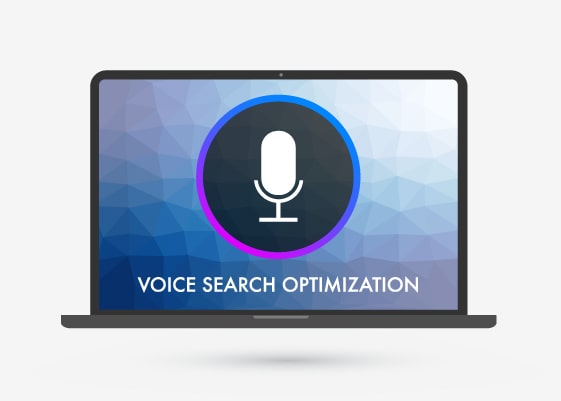SEO Company Cape Town Guide To Voice Search
In this excellent SEO Company Cape Town Guide To Voice Search we explore how to optimise for this exciting extension for how people search. Although voice search has been around for a while now, it has only become more and more common to conduct web searches with smart TV’s and speakers recently. It’s easy, fast and convenient and has therefore really revolutionised the way we conduct search.
However, this newer way of searching is of course not without a few catches that present new challenges for SEO optimisation. This is due to the fact that a voice search is completely different from a text-based search, and therefore the SEO for these kinds of searches must be adapted accordingly. In this SEO Company Cape Town Guide To Voice Search we will bridge the divide.
You see, voice search is related more closely to our natural speech patterns and less robotic than text – which also means the way voice search is ranked is different and, yes… more difficult. Devices compatible with voice search tend to only list the up to the very top 3 results for a question, and although landing one of those spots is not easy, in this guide, we will show you how!
What is Voice Search? How Does It Work according to our SEO Company Cape Town Guide?
Starting with the basics, you must first understand how exactly voice search works in order to optimise it for SEO. In a typical, straightforward voice search users would activate their device with a phrase like “Hey Siri” or “Alexa?” followed by their search question. The device then provides a spoken response, and if it has a screen, may also display the top web results there too.
![]()
Voice search optimisation thus tries to ensure your content a spot in this distinct kind of search.
What is Voice Search Optimisation?
Voice search optimisation uses a number of SEO techniques, that we will be guiding you through, to increase the likelihood of your content ranking in voice search results.
Now because voice search presents very differently to content optimised for text queries, it’s critical that we adapt our SEO techniques so that voice search technologies and virtual assistants recognise your page as one of the top results. In this SEO Company Cape Town Guide we will walk you through the bigger picture and then give you actionable steps to optimise for.
Why is Voice Search Becoming such a Big Deal?
There are a few main factors behind why voice search seems to be growing so quickly:
Firstly, the obvious is that using your voice is faster than typing on a keyboard, and faster searches equal faster results. So why wouldn’t you opt for voice instead?
Secondly, voice search is a technology that works especially well with smartphones, and since almost everyone carries one around in their pocket, it has become the more convenient option much of the time. At time of writing, As of 2025, around 20.5% of people worldwide actively use voice search that’s nearly one in five individuals, and that number is steadily growing more and more. What is more, according to Demand Sage, is that there are about 8.4 billion voice assistants being used globally, that’s more than the entire population and highlights how widespread voice tech is becoming.
Also, 90% of adults were aware of voice search assistants t according to PWC’s voice revolution study. Furthermore, three out four of these individuals are using their voice assistants in the comfort of their home.
So to be clear: voice search is not a trend and it’s certainly not going away anytime soon (in fact, it will likely only continue to grow) and its effects have already been felt by SEO. While there’s some intersections between on-page SEO optimisation and voice search optimisation, voice search is unique and its differences must be understood before you can optimise effectively.

1. Voice and How Users Search:
The two most important ways that voice changes how we search for queries pertains to searches being evidently longer and subsequently, more conversational.
Bing engineers have reported that voice searches are definitively more extended than that of text, and as a result they are less robotic and closely mimic how we speak in real life.
In fact, text searches are typically between 3 – 4 words, whereas it has been found that searching that same thing through voice extends the number of words significantly. For this SEO Company Cape Town Guide To Voice Search, we looked at Semrush’s state of search for the average number of words used in a search query.
This brings into question the way we need to conduct keyword research for SEO, which we will speak to further on in this SEO Company Cape Town Guide To Voice Search.
2. Voice and Where Users Search:
Usually people have to wait until they are somewhere where they are able to type on a keyboard safely or open a laptop to conduct a search which often means finding some kind of private space.
But with voice compatible devices, like smartphones specifically, the convenience of being able to whip out your device from your pocket and quickly search for something while on the move means that many more people are much more likely to use search in a public space.

3. Voice and How Users Access Results
The reality is that Google and other search engines are actually becoming more like answering machines and less like search engines. In this SEO Company Cape Town Guide
Organic clicks have dropped by as much as 37% due to the simple fact that updates in these technologies mean a user no longer has to sift through 5 – 10 results to find what they’re looking for because its immediately right there in the search results.
And that has been taken even another step further with voice tech, allowing the answer to be read out to you within seconds as Google tends to simply read the featured snippet back to you.
This means that SEO and content creators must focus on optimising content/web pages that provide direct and succinct answers if your content wants to even stand a chance getting in front of people.
But how? First, we need to start with some voice keyword research.

SEO Company Cape Town Guide To Voice Search: Keyword Research for Voice Search
Prioritise “Natural Language” Keywords:
Like we’ve covered already, voice search favors more conversational and natural-sounding keywords to text-based search. This means that more computer-sounding sounding keywords are being replaced by longer form queries.
If you focus on identifying more organic keywords as well as still taking into account the usual tools like search volume, CPC and seasonal trends, this will give your page a big boost especially as voice search continues to flourish.
Include those Extra-Long Keywords:
It’s pretty common for SEO to actually completely exclude the use of really long key terms due to the obvious being that very few people search for them.
This is quickly changing as more and more people utelise voice search, and as a result what is considered ‘normal’ keyword length is getting longer and longer.
We don’t want to create our entire page around these longer keywords or terms, but as we will explain, Google picks up keywords anywhere in a piece of content, so don’t be afraid to sprinkle in 5+ keywords to optimise your content.
“Question Words” are Important:
According to Search Engine Watch, questioning keywords are up by 61% year after year due largely to the boom in voice search. Due to the way we naturally talk, when we use voice initiated search, we are way more likely to lead with a question word and phrase rather than a statement.
Now that we understand what keywords work best with voice search, we can utelise them to optimise for SEO.

Optimising Content for Voice Search Results
Capturing organic search traffic is important no matter what industry you’re in, and voice search provides another great avenue to do that.
Furthermore, tapping into the voice search market can directly increase your site’s overall ranking, as search engines do tend to favor websites optimised specifically for voice, which increases the amount of authority your site holds overall.
With this being said, there is truly no need to completely redo your entire site. With these few simple tricks, according to our
SEO Company Cape Town Guide you can get your site voice search ready in no time.
1. Succinct and Brief Answers are Key
Optimizing your page’s content to include answers that are 29 words means Google will likely tend to prioritise the content more.
However, it obviously doesn’t make much sense to write a whole blog post consisting of 30 words… and that’s where FAQ pages come in.
2. Create FAQ Pages for Voice Search Accessibility
Like we have learned, question keywords are on the up! And therefore, Frequently Asked Question content speaks directly to this and will help optimise your content for voice search tremendously.
FAQ utilise both question keywords as well as concise answers which is probably the reason that voice search results are 1.7x more likely to come from an FAQ page than desktop results.
3. The Featured Snippet Hack
Once you realise that almost half of all voice search results are taken directly from Google’s featured snippet, it’s importance becomes clear.
The featured snippet becomes even more crucial for devices like Google Home and Alexa that only give a user one single answer from the snippet – making your content essentially invisible if it does not rank there (on those devices).
4. Conversational Content
This one we have covered before, just pay extra attention in ensuring your content is at least for the most part, written in a natural and non-robotic style.
5. Utilising Long Tail Keywords for Longer Content
It would make no sense for you to create a number of pages specifically optimised around a large number of voice related searches.
Interestingly, a very small percentage of voice search results contained the exact keyword in the title tags. This is because Google will actually pull the answer from any part of the page even if the matching content takes up a small part of it.
Therefore, by embedding longer keywords and phrases within your already existing content, it will be able to rank for a wide range of voice searches.
6. Mobile Optimisation
Because smartphones are where a large percentage of voice related searches come from, consider it critical that your site is mobile friendly. Make sure your site speed is fast, contains responsive design and is above all user-friendly.
Additionally, Google actually uses good mobile user experience as one of the primary factors in overall ranking, voice search or not.
Advanced Tips and Tricks from our SEO Company Cape Town Guide
If you feel like that’s still not enough and you’re keen to do more to optimise your site for voice search, consider these more advanced SEO techniques.
1. Filler Words
When you go to optimise your content with question keywords, make sure to include some “filler words” like “I”, “and” “of” and “the”.
When we speak we naturally use these words as part of our question, and therefore Google is more likely to pull a match.
2. Avoid Jargon and Academic Style
Studies conclude that the average voice search result is very basic to the point that a ninth grader would be able to understand it.
Therefore, when optimising for voice search, make sure your content writing is clear and avoids any jargon or more complicated words if you want to rank higher.
3. Strengthening Domain Authority
The more links a site has, especially from semantically aligned websites ( a secret hint from our SEO Company Cape Town Guide To Voice Search), the more likely it is to rank more often in voice search.
With voice search results, Google is looking to give a singular answer – but the algorithm needs to know this answer is coming from a reliable source. Therefore, focus more on building up domain authority over page authority as this is likely what Google will use to determine if a piece of content is trustworthy or not.
4. More Focus on “Near Me” Searches
This is especially critical if you run a local business. The growth in “Near Me” searches, especially with voice search users means you must optimise key terms that they use: 76% of voice searches have local ‘near me’ intent, showing how users rely on voice to find nearby services
Businesses that optimise their content for their direct surrounding areas are much more likely to rank higher in hyper-local searches.
5. Schema Markup Benefits
Like many of these advanced suggestions, this is not exactly specific to voice search, and will actually improve your on-page SEO overall.
Schema markup is essentially coding that you add to your HTML that includes things like trading hours, address, contact info, reviews etc. and helps Google match to more detailed results.
This information is however invisible to search users – instead it is used primarily so bots can better decipher your content and its relevance, and making it more visible to users.
We hope these SEO tips we shared will make your content stand out to the Siri’s and Alexa’s of the new age of search we find ourselves in. Voice Search is only set to grow from strength to strength, and even if you don’t see immediate results, keep plugging away as this advice will not only improve your voice search rankings, but your site’s overall SEO, too.
